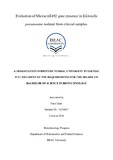Evaluation of MicrocinE492 gene presence in Klebsiella pneumoniae isolated from clinical samples.
Abstract
Bacteriocins are small peptides with anti-bacterial properties. Among which, micrrocin E492 (MccE492) is a low-molecular-weight, channel-forming bacteriocin produced by Klebsiella pneumoniae. However, micrrocin E492 is active on strains of Enterobacteriaceae family. Moreover, it also has a cytotoxic effect on several malignant human cell lines. Recently, there is a growing rate of development of antibiotics-resistant bacterial strains. Secondly, Drug Related Problems (DRPs) in cancer is also a severe issue in the world. Thus, these two emerging concerns require related advanced researches for better therapeutic outcome. The present descriptive analytical study is carried out to determine the presence of Klebsiella pneumoniae with mceA gene, encoding for microcin E492 in clinical specimens isolated from patients with burn infection and respiratory tracts diseases. However, in this study, 65 clinical samples from burn wound and respiratory tract infection were collected. Then using different phenotypic characterization and biochemical testing, Klebsiella pneumoniae were isolated and identified from the specimens. Finally, polymerase chain reaction (PCR), using gene specific primers, was carried out to confirm the presence of mceA gene in the selected samples. A total of 7 Klebsiella pneumoniae samples were found to be positive with mceA gene, which means 14% of the total sample contained the gene. This thesis work helped to establish a data for the very first time in Bangladesh based on the frequency of Klebsiella pneumoniae containing mceA gene in hospitalized patients with burn wound and respiratory tracts infection.

